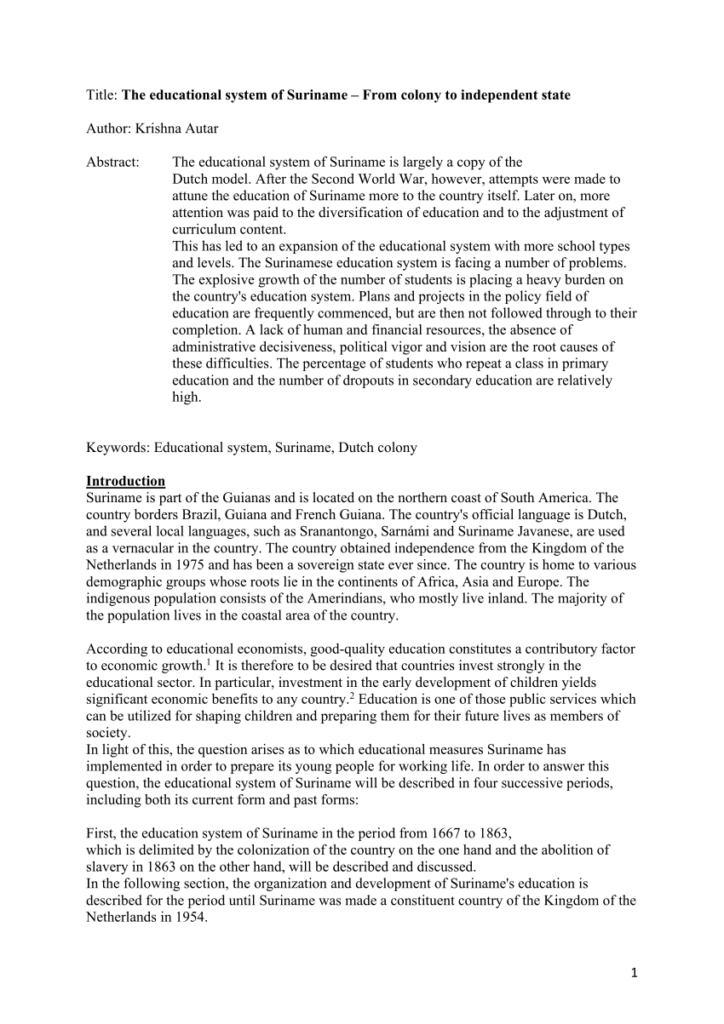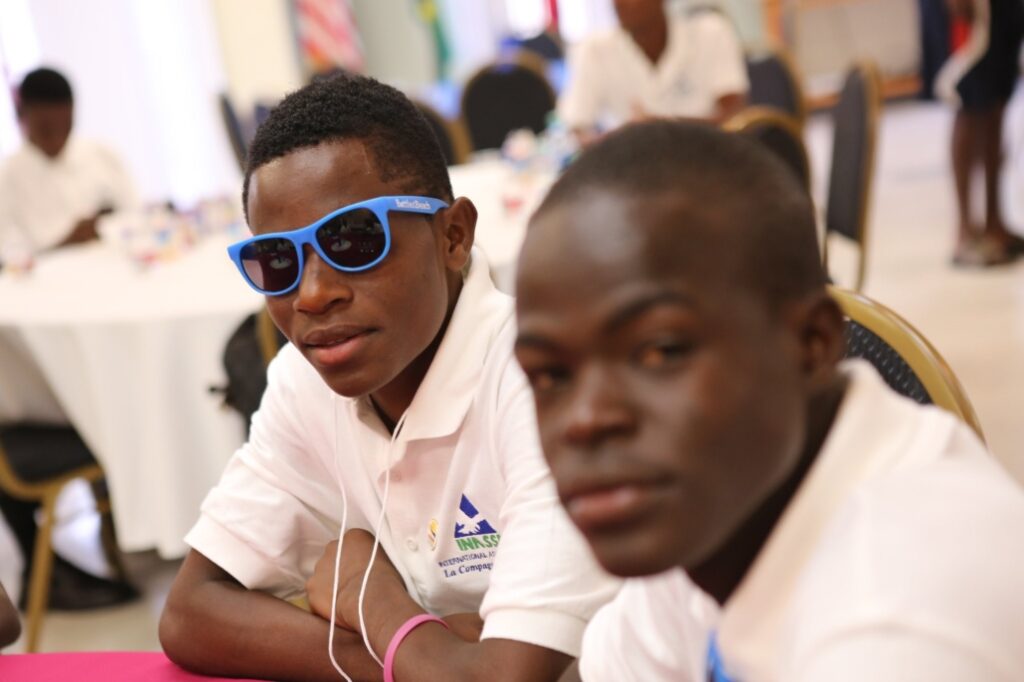If you’re curious about the ins and outs of Suriname’s education system, look no further. This article provides a comprehensive overview, shedding light on the various facets of education in this South American country. From early childhood education to higher education, we’ll explore the structure, challenges, and opportunities within Suriname’s education system. Whether you’re an educator, student, or simply interested in learning about different educational systems around the world, this detailed look at Suriname’s education system is sure to captivate your attention.
Overview of Suriname’s Education System
Suriname’s education system has evolved over the years to provide quality education to its citizens. The system is rooted in a rich history that has shaped its structure and approach to education. Key stakeholders play a vital role in ensuring the smooth functioning of the system and the success of its students.
Brief history of Suriname’s education system
Suriname’s education system has undergone various changes since its colonial era. During Dutch colonization, education was restricted to the elite and focused primarily on religious instruction. With surindependence in 1975, the government prioritized education and implemented reforms to ensure access for all Surinamese citizens.
Structure of the education system
Suriname’s education system is divided into several levels, starting from primary education and progressing to secondary, technical and vocational, higher education, special education, and teacher education and development. Each level has its objectives, curriculum, and assessment methods, providing students with a well-rounded education.
Key stakeholders in the education system
The Ministry of Education is the primary governing body responsible for overseeing and developing Suriname’s education system. They work closely with other stakeholders, including teachers, parents, students, and community organizations, to ensure the system’s effectiveness and address any challenges that arise.
Primary Education in Suriname
Compulsory education in Suriname
Primary education in Suriname is compulsory for children between the ages of six and twelve. This ensures that every child has the opportunity to receive a basic education and lays the foundation for their future academic and personal development.
Primary school curriculum
The primary school curriculum in Suriname focuses on core subjects such as mathematics, language arts, science, social studies, and physical education. It aims to develop students’ cognitive skills, social-emotional development, and creativity. The curriculum is designed to be engaging and interactive, providing students with a well-rounded education.
Teaching methods and strategies
Primary education in Suriname employs various teaching methods and strategies to enhance student learning. These include project-based learning, group work, hands-on activities, and educational technology integration. Teachers are encouraged to create a stimulating and inclusive learning environment that caters to the diverse needs of their students.
Secondary Education in Suriname
Transition from primary to secondary education
After completing primary education, students in Suriname typically transition to secondary education. This transition is facilitated by counseling and comprehensive guidance programs to help students choose the appropriate secondary school that aligns with their career aspirations and interests.
Types of secondary schools in Suriname
Suriname offers several types of secondary schools, including general secondary education (VWO), pre-university education (HAVO), and vocational education (VET). These schools provide students with subject-specific knowledge and skills, preparing them for further education or entry into the workforce upon graduation.
Curriculum and subjects at the secondary level
The curriculum at the secondary level in Suriname covers a wide range of subjects, including mathematics, languages, sciences, social sciences, and humanities. The aim is to provide students with a comprehensive education that prepares them for higher education or vocational careers after graduation.
Technical and Vocational Education in Suriname
Importance of technical and vocational education
Technical and vocational education plays a vital role in Suriname’s education system by equipping students with practical skills and knowledge required for specific trades and occupations. These programs provide valuable opportunities for students to explore career pathways and develop employable skills.
Available technical and vocational programs
Suriname offers various technical and vocational programs in fields such as agriculture, computer science, construction, mechanics, tourism, and healthcare. These programs provide a blend of classroom and practical training, ensuring that students gain hands-on experience in their chosen fields.
Partnerships with industries and businesses
To enhance the quality and relevance of technical and vocational education, Suriname’s education system fosters partnerships with industries and businesses. These collaborations ensure that students receive training that aligns with industry standards and equip them with the skills demanded by employers in the job market.
Higher Education in Suriname
Universities and colleges in Suriname
Suriname has several universities and colleges that offer undergraduate and graduate programs. Anton de Kom University is the country’s largest and oldest university, offering a wide range of disciplines, including social sciences, law, medicine, and engineering.
Undergraduate and graduate programs
Higher education institutions in Suriname provide undergraduate and graduate programs in various fields. Students have the option to pursue bachelor’s, master’s, and doctoral degrees, giving them the opportunity to specialize in their areas of interest and further their academic and professional careers.
Research and innovation in higher education
Suriname’s higher education institutions place a strong emphasis on research and innovation. Faculty and students are actively involved in research projects that contribute to the country’s development and address societal challenges. These research endeavors foster critical thinking, problem-solving, and the creation of new knowledge.
Special Education in Suriname
Inclusive education in Suriname
Suriname promotes inclusive education, ensuring that students with disabilities have equal access to quality education. Inclusive schools provide support and accommodations to meet the diverse learning needs of students and foster an inclusive and accepting environment for all.
Support services for students with disabilities
Special education services in Suriname include individualized education plans, assistive technologies, and specialized teaching methodologies. These support services aim to empower students with disabilities to succeed academically and develop their full potential, promoting inclusive and equitable education.
Training and professional development for special education teachers
Suriname recognizes the importance of skilled special education teachers. The education system provides training and professional development opportunities for teachers to enhance their knowledge and skills in supporting students with disabilities effectively. These initiatives ensure that students receive the necessary support to thrive in their educational journey.

Teacher Education and Development in Suriname
Teacher training programs in Suriname
Suriname’s education system places great emphasis on the quality of its teachers. Teacher training programs are designed to equip educators with the necessary pedagogical knowledge, teaching strategies, and classroom management skills. These programs ensure that teachers are well-prepared to create engaging and effective learning environments.
Professional development opportunities for teachers
Continuing professional development opportunities are available to teachers in Suriname. These opportunities include workshops, conferences, and collaborative projects that enable teachers to enhance their teaching practices, stay abreast of educational trends, and foster a culture of lifelong learning.
Challenges in teacher education and development
Despite efforts to improve teacher education and development, Suriname still faces challenges in this area. Some challenges include the need for more resources and funding, attracting and retaining qualified teachers, and ensuring equitable access to professional development opportunities across the country.
Education Funding and Administration in Suriname
Sources of funding for education in Suriname
Suriname’s education system is funded through various sources, including government allocations, international aid, partnerships with private organizations, and tuition fees. The government plays a significant role in providing financial support to ensure the availability of resources and infrastructure for quality education.
Role of the Ministry of Education in administration
The Ministry of Education is responsible for administering Suriname’s education system. They oversee policy development, curriculum implementation, teacher certification, and the allocation of resources. The ministry collaborates with stakeholders to ensure effective administration and continuous improvement of the education system.
Education policies and reforms
Suriname’s education system has undergone policy reforms to address emerging challenges and promote educational excellence. These policies focus on inclusivity, quality enhancement, equitable access, and the integration of technology. The government is committed to continuous improvement, ensuring that Surinamese education remains relevant and responsive to societal needs.

Quality Assurance and Assessment in Suriname
Quality assurance mechanisms in Suriname
Suriname has established quality assurance mechanisms to ensure the delivery of high-quality education. These mechanisms include curriculum reviews, teacher evaluations, school inspections, and student assessments. Regular monitoring and evaluation help identify areas for improvement and maintain standards across the education system.
National examinations and assessments
National examinations and assessments play a role in evaluating student performance and determining progression to the next level of education. These assessments provide a standardized approach to measure student knowledge and skills. They also play a role in identifying areas of improvement and informing curriculum development.
Monitoring and evaluation processes
Suriname employs monitoring and evaluation processes to assess the effectiveness of its education system. This includes evaluating student achievement, school performance, and the implementation of education policies. Evaluation results inform decision-making, allowing for evidence-based improvements and ensuring the system’s overall quality and relevance.
Challenges and Future Directions of Suriname’s Education System
Addressing disparities in educational access and quality
Despite significant progress, Suriname still faces challenges in achieving equitable access to education and ensuring consistent quality across the country. Addressing this disparity requires targeted interventions, such as improving infrastructure in rural areas, increasing funding, and providing professional development opportunities for teachers in remote regions.
Improving teacher retention and motivation
Suriname faces the challenge of retaining and motivating qualified teachers. This can be addressed through competitive salaries, better working conditions, continuous professional development opportunities, and recognition of teachers’ efforts in the form of incentives and rewards. Ensuring a supportive and fulfilling work environment will enhance teacher satisfaction and positively impact student outcomes.
Promoting lifelong learning initiatives
Suriname recognizes the importance of lifelong learning in the rapidly changing world. The education system aims to promote lifelong learning initiatives that empower individuals to acquire new skills and adapt to evolving societal needs. Emphasizing the value of continuous learning prepares individuals for personal fulfillment and ensures their contributions to the country’s development.
In conclusion, Suriname’s education system has made significant strides in providing quality education to its citizens. From primary to higher education, special education, technical and vocational education, and teacher education and development, the system is designed to cater to diverse learner needs. However, challenges persist in terms of educational access and quality, teacher retention, and addressing disparities. By addressing these challenges and promoting lifelong learning, Suriname can further enrich its education system and empower its citizens for a brighter future.


